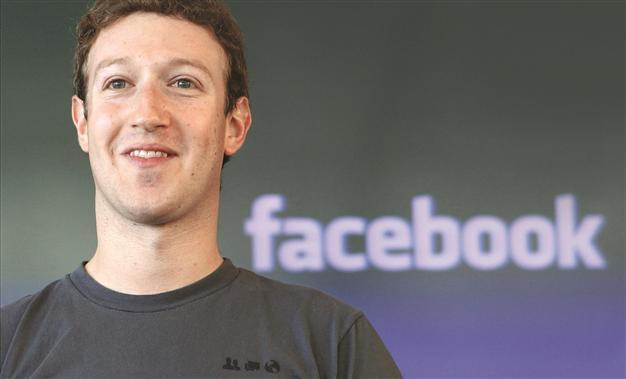Happy birthday, Facebook
Emrah Güler

Mark Zuckerberg’s creation has gone from a small campus-based social networking site to a global behemoth in just 10 short years. AP Photo
There could be as many as 1.23 billion Happy Birthday messages on the Facebook wall of Mark Zuckerberg, the co-founder, chairman and chief executive officer of Facebook, tomorrow when, not Zuckerberg himself, but the biggest social networking website celebrates its tenth anniversary.From a Harvard University dorm, to a company that is worth $135 billion, and that will probably become the fastest in history to reach $150 billion according to Bloomberg Businessweek, Facebook has come of age with half of the world’s population with a connection to the Internet having a profile on the social networking site.
Spreading its wings across the globe by the minute, Facebook has always been popular in Turkey since its first penetration in 2007 into a country fascinated by new technology, and had long made the Internet an integral part of daily life. Since then, Turkey has almost always been among the top ten countries with the highest number of Facebook members.
Nearly half of Turkey’s population, reaching 40 million, is on the Internet. A staggering 33 million of these are on Facebook, and 19 million log onto their Facebook account at least once a day, according to Fırat Dirik, Facebook Global Marketing Solutions Sales Manager for Turkey. Another research study shows the increase in social media use in the last two years has displayed an average of a 300 percent increase.
Facebook: The go-to medium for word-of-mouth marketing
With a tech-savvy heavily young population that is active on the Internet (69 percent of the 18-29 demographics use social media), Facebook is becoming the go-to platform both for businesses and citizen journalism in Turkey (albeit Facebook’s censorship hovering over as a major recurring problem). From major corporations, to small start-ups, businesses in Turkey have been in the social media game for the last four years, each having its own Facebook page from dozens to millions of ‘like’s.’
Advertising agencies are quietly opening the way for social and digital agencies. Well, maybe not quietly. In the last three years, some 200 start-ups working on social media have opened in Turkey.
Companies are allocating as high as 100 million Turkish Liras for social media campaigns and marketing budgets allocated to social media have gone up from a maximum of three percent to as high as 50 percent in three years.
Turkcell, the leading mobile phone operator in Turkey, is also the leading name on Facebook, its Facebook page having just surpassed the 3 million ‘like’ mark. Working with bloggers and showering its Facebook followers with campaigns, contests and mobile apps, Turkcell, like many big companies have come from the social media age. Two years ago, Garanti Bank, another major player on Facebook, was the most popular financial institution in social media across the globe.
Facebook Pages are interactive. They are engaging. They can continuously deliver a steady flow of content attracting and, maybe more importantly, retaining existing and potential customers. They are the ideal medium for word-of-mouth marketing and constant exposure. More and more companies in Turkey are becoming aware of this. Whether you are the manager of an art gallery, selling pesticides or organizing a film festival, most of your audience is on Facebook. And they are interacting with each other, generating the buzz you spend precious hours and money on with your marketing team.
Citizen journalism and its silencing
Last summer’s nationwide protests led many to reach out to social media upon the refusal of mainstream media to have unbiased coverage, led with misinformation, and heavy censorship becoming the norm. Many on the streets with smart phones became citizen journalists. Within days, there were dozens of Facebook pages that served as alternative media outlets.
Along with citizen journalism came stories of censorship from the Facebook management. Censorship had occasionally taken the news before the protests, like when the Facebook page of DurDe! (Say Stop), Turkey’s biggest grassroots anti-racist initiative, had been closed about a year ago for no apparent reason on Facebook’s part.
During the protests, many Facebook pages were shut down, or were faced with what could be called semi-censorship, which included sanctions such as admins not being able to post, deleting some of the posts or some of the comments. Ötekilerin Postası, the Others’ Post, was one of these, shut down three times in a month, although there weren’t any problems throughout its active life since late 2012 up until the protests last June.
In early 2012, a frustrated low-wage former employee had leaked information on Facebook’s censorship policies, that Facebook recruited low-wage third-world contractors to monitor the country pages and delete certain content with no proper systems of control. While unarguably bringing the world closer, Facebook seems to be a microcosm of the world order, where corporate giants are favored for bringing in money through advertisement revenues and where alternative voices are occasionally silenced for disrupting the status quo. Happy birthday, Facebook.
















